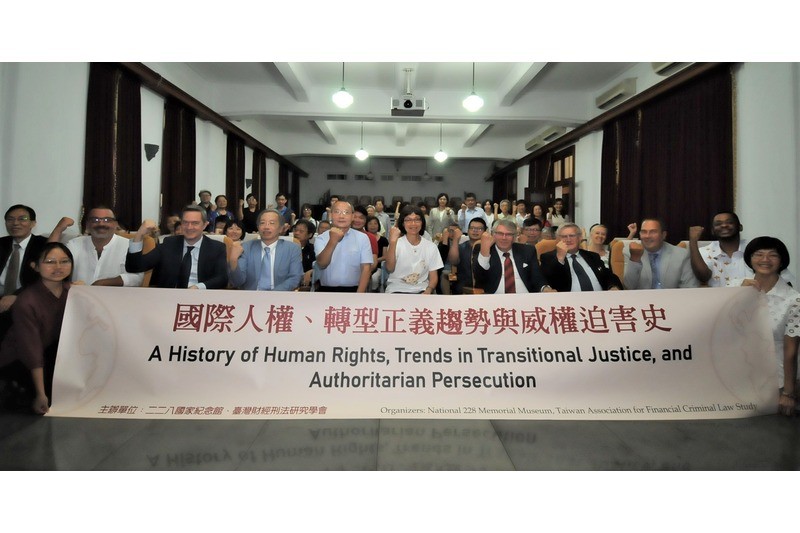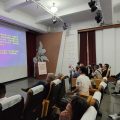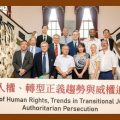Source : 31/07/2023 STORM MG https://www.storm.mg/localarticle/4846827
Taiwan’s democracy and freedom are flourishing and have received international acclaim, but what about Taiwan’s transitional justice? In late July this year, a special group of European and American human rights scholars jointly visited Taiwan. Seven international human rights scholars from five countries including France, the United States, the Netherlands, Belgium and Italy , July 28 to participate in the “International Human Rights, Transitional Justice Trends and History of Authoritarian Persecution” forum. Yang Zhenlong, executive director of the organizer of the February 28 National Memorial Hall, pointed out that there were no perpetrators in the February 28 incident, so who should the victims forgive? Chen Zhilong, chairman of the Taiwan Society of Finance and Criminal Law, another organizer, and Zeng Jianyuan, chairman of the Governors League who were invited to attend, both spoke at the meeting. For example, in the case of Taijimen, the perpetrators were promoted repeatedly, so international scholars clamored that the government should face up to the problem and solve it as soon as possible, otherwise “the facts of human rights violations will be excluded, just like keeping landmines on the battlefield.”
Christine Mirre, vice-chairman of the French Coordination for Freedom of Conscience of Individuals and Organizations, said that what she felt during this visit was that the police and soldiers who were supposed to be protectors of Taiwan from the Japanese occupation turned into oppressors. Taiwan must really turn the page, otherwise it will be a wound that has not yet healed. This is indeed unknown to Western countries. She believes that this is indeed a big wound for Taiwan.
Eric Roux, chairman of the European Forum for Religion and Religious Freedom, said that the truth is the most important part of transformational justice. Without the truth, it cannot be repaired, but most of the time the truth is not revealed, because the perpetrators committed crimes, and of course they do not want the truth to be revealed, so A large part of transformational justice is confronted with what the truth is? Confronting and analyzing the whole incident and making reparations based on it will help heal a country, if the truth is not told and everything is sealed, then the whole country is suffering, not just the victims.
Yang Zhenlong, executive director of the 228 National Memorial Hall, said that the 228 incident was a very important massacre in Taiwan’s modern history. He is a family member of the victim himself. He said that the 228 Memorial Hall has many sad memories, but it is not to immerse everyone in sadness In the middle, but to let everyone not forget 228, not to repeat the same mistakes. However, he also pointed out that “Taiwan’s transformational justice has not been done enough.” 228 was a major massacre in Taiwan’s modern history, but there were no perpetrators. Who should forgive a bunch of victims? In Taiwan’s forgetful society, there is no fairness and justice at all. It is more difficult to insist on doing the right thing, but he still hopes to continue.
Professor Chen Zhilong, chairman of the Taiwan Institute of Economics and Criminal Law, said that Taiwan lifted the martial law in 1987, and on the surface it entered the democratic rule of law; but there are tax incentives for tax inspections, which is the residual authoritarian system and thinking. He pointed out that the persecution of Taijimen was also affected by this corruption system. In particular, years of authoritarian rule have already penetrated into the judicial and administrative bureaucratic systems, and there are still cases of political persecution in the post-authoritarian period. The government should not stop the retroactive deadline for transitional justice laws in 1992.
The Taijimen case is listed by the Supervisory Council as a major national human rights protection case. Christine Mirre, vice-chairman of the French Coordination for Freedom of Conscience for Individuals and Organizations, emphasized that although Taiwan is committed to democracy, the unresolved issues in the Taijimen case have tarnished the reputation of Taiwan’s democracy. The government should face up to and accept the facts, examine mistakes and uphold justice, return justice to Taijimen, and maintain Taiwan’s international reputation. (Related report: Prime Minister visits China but does not mention human rights, Taiwan Strait issue New Zealand Foreign Minister: Handle relations with China very carefully |More articles )
Massimo Introvigne, editor-in-chief of Bitter Winter magazine, also called on the Taiwanese government to return to the spirit of conscience and demand that the injustice be corrected in a practical and political way. Especially in the post-authoritarian Taiwan Taijimen human rights persecution case in 1996, people have the right to demand transitional justice, especially after the transition from a dictatorship to a non-dictatorship, “We all love justice, and Taijimen certainly deserves justice.”





